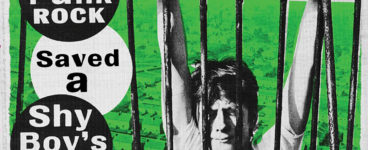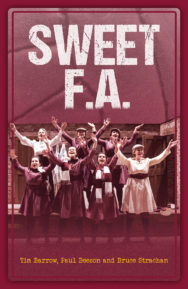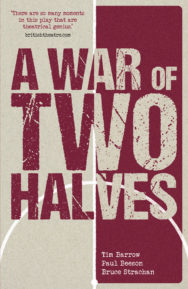‘When theatre and football combine, the results are extraordinary’
Tim Barrow takes us into the inspiration of his two plays, alongside co-creators Paul Beeson and Bruce Strachan, A War of Two Halves and Sweet F. A., exploring the intersection of where theatre and football meet, and just why they were drawn to the Hearts men’s and women’s teams of around a century ago.
A War of Two Halves and Sweet F. A.
By Tim Barrow, Paul Beeson and Bruce Strachan
Published by Tippermuir Books
When theatre and football combine, the results are extraordinary.
McCrae’s Battalion is famous in Scotland and cherished by the community of Heart of Midlothian FC. The 1914 team were on the verge of becoming league champions, winning 19 of the opening 21 matches of the 1914-15 season. But they volunteered, en masse, to fight in the First World War for the charismatic Sir George McCrae; many subsequently lost their lives in France. Their story is woven in to the history of the football club.
As theatre-makers and Hearts fans, this astonishing story was a natural draw. And a long time in the making. In 2004 Tim Barrow gifted a copy of Jack Alexander’s brilliant book McCrae’s Battalion to Bruce Strachan. They had sat together in high school history classes, learning about the Great War. Bruce and Paul Beeson had sat together as Hearts season ticket holders in Section G of the Wheatfield Stand during the early 2000’s. In 2017, all three got talking about creating a show for the Edinburgh Fringe. Plans formed to tell the tale of the ‘soldier footballers’.
Access was granted to the Hearts Museum, encouraged by Lianne Parry (Head of Heritage), as well as Tynecastle Park itself, including the Home dressing-room, and newly built Main Stand. In a historical echo, in 1914, players and fans had their own new stand to contend with – there were similar grumblings over the cost and why players were sold to finance it!
The production was an unbelievable success. Embraced by football fans, and beloved by the performers, who keenly felt the privilege of telling this story of people with living relatives, many of whom came to see our production. Their names are commemorated in the stadium’s Memorial Garden – men such as Harry Wattie, Duncan Currie, Ernie Ellis, James Speedie – alongside those who survived the war, even continuing to play for Hearts such as Patrick Crossan, described as the best passer of a ball, and, following his retirement from football, the handsomest publican on Rose Street! We strove to honour their memory and respect their legacy. To finish our play with the words of those who served, in the tranquillity and grace of the club’s Memorial Garden, is a uniquely powerful theatrical moment.
How do you follow A War of Two Halves?
With a story of women’s football.
2021 marked the centenary of the ban on women’s football by the Scottish F. A. A shameful episode, largely ignored or hidden. Sweet F. A. began as a conversation between Bruce and Ann Park (Director – Communities and Partnerships at Hearts) who pointed out that just before the ban there had been a women’s match at Tynecastle which had drawn a huge crowd and had been refereed by Hearts legend, Bobby Walker.
Paul, Tim and Bruce researched the early days of the women’s game, joined by performers Heather Cochrane, Ria McLeod, Rachel Millar and Lucy Pedersen. They alerted us to famous players such as Helen Graham – a Montrose local who was played in the first women’s international match at Easter Road in 1881 where Scotland beat England 3-0 – and Lily Parr, possibly the greatest female player ever, honoured with her own statue in Manchester. Our performers gave voice to our characters, and all went on to become original cast members in the 2021 production.
We aimed to spotlight a real football team arising from the factory teams of the First World War. But asides from the famous, well-documented Dick, Kerr’s Ladies from Preston, we were shocked to find a dearth of material about the women’s game. This contrast between the known facts – a clearly popular game which attracted 53,000 for one women’s match in 1920 – and the lack of research material available, is stark. Thankfully, due to the work of historian pioneers such as Dr Fiona Skillen, this is changing, just as the women’s game only grows in strength.
The ban, shockingly, wasn’t repealed until 1971. Scotland was the final nation to do so! Highlighting the ban and women’s fight to just play football and gain equality in the sport, became our mission. Today, our daughters can play as a recognised choice, thanks to the struggle of those before them. Pathways exist to professional status for women footballers, although the disparity with the men’s game is huge. There remains a long way to go.
Sweet F. A. attracted brilliant reviews and rapturous audience response. The production was staged on a purpose-built set constructed high in the Main Stand at Tynecastle Park. With the stadium as a backdrop and the sun setting, the cast sang their hearts out, refusing to accept that women hang up their boots. It was the most spectacular drama of the Fringe. We are thrilled that the play has become a book, giving it further opportunity to find audiences.
By Tim Barrow
A War of Two Halves and Sweet F. A. by Tim Barrow, Paul Beeson and Bruce Strachan are published by Tippermuir Books, priced £9.99.
ALSO IN THIS ISSUE

 The Trials of Mary Johnsdaughter
The Trials of Mary Johnsdaughter
‘A hairst sun was dipping in the west, casting a final evening glow through the schoolhouse at Happy …

 David Robinson Reviews: Alternatives to Valium
David Robinson Reviews: Alternatives to Valium
‘The same school that told him he shouldn’t even sing in a chorus gave the careers advice that he wa …














